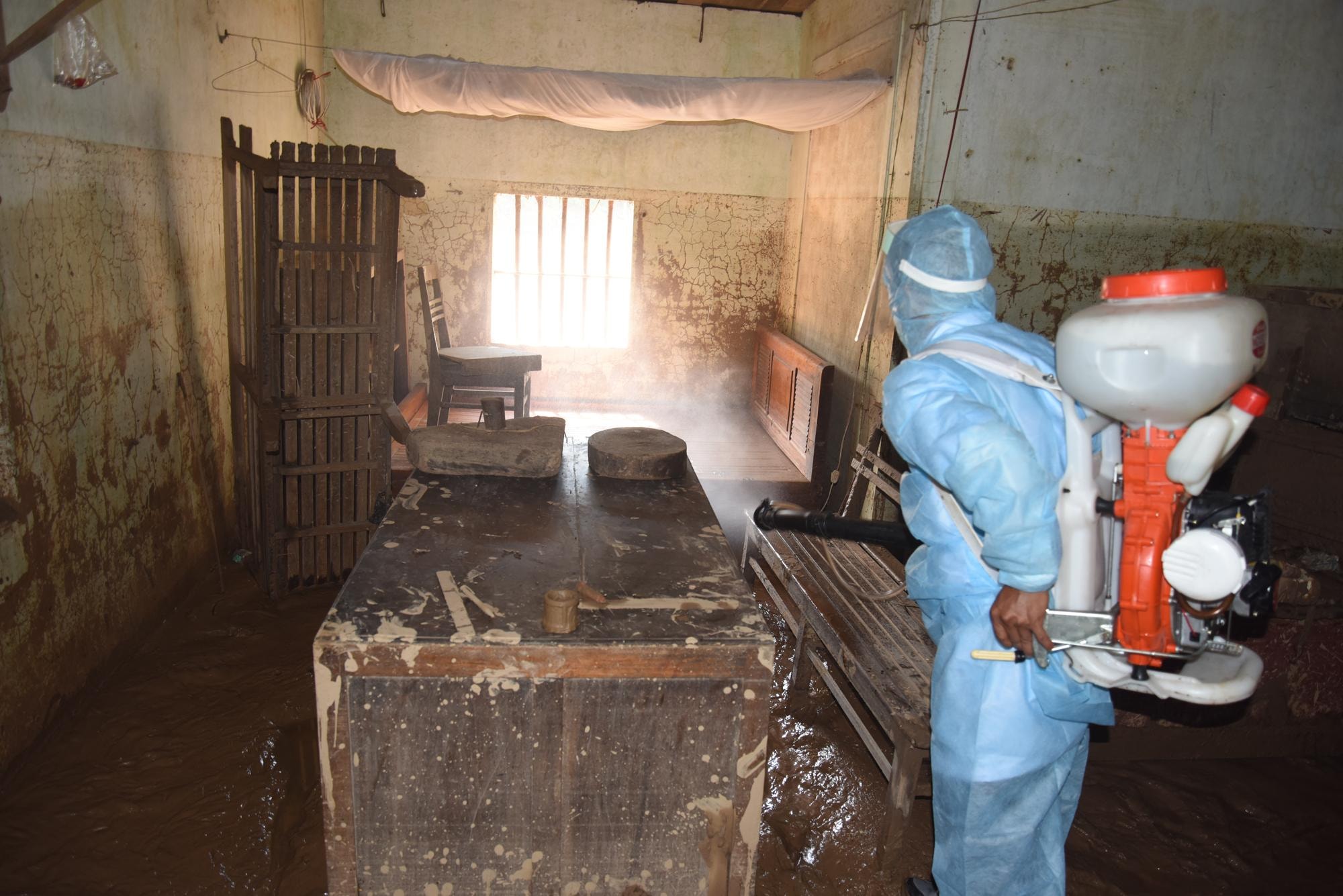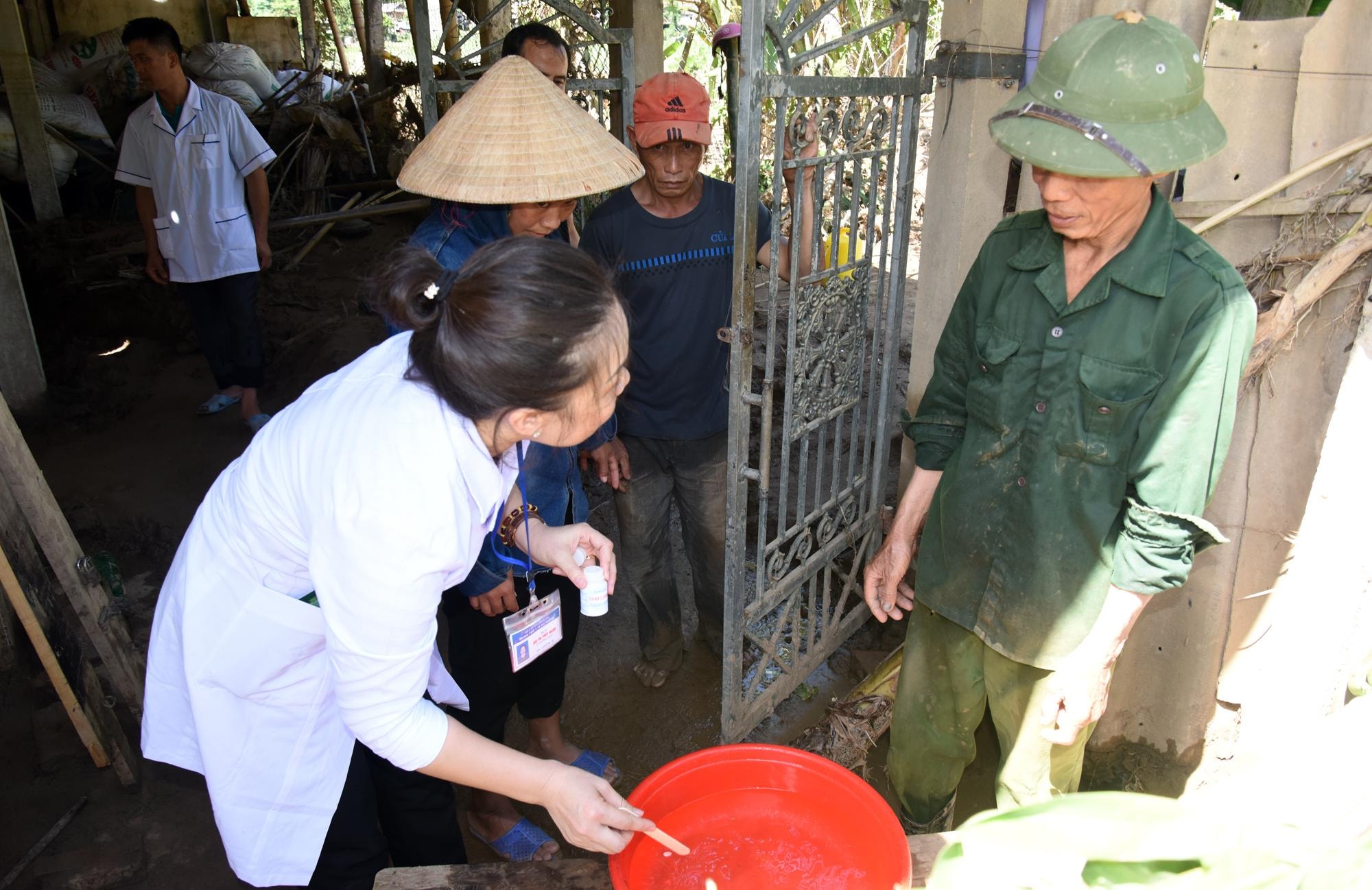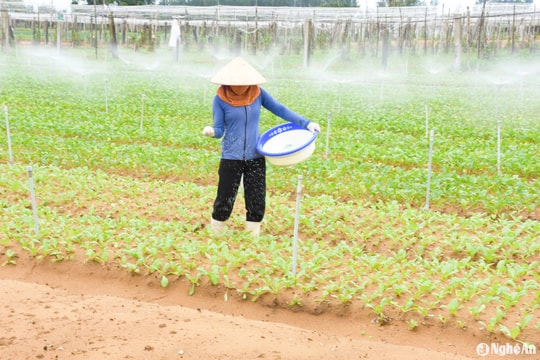Proactively prevent diseases caused by floods and rains
(Baonghean.vn) - Due to the impact of storm No. 4, Nghe An province has had heavy rains causing isolation and flooding. In flooded areas, the risk of disease outbreaks threatening people's health is very high. Nghe An health sector is directing medical units to actively implement prevention measures.
Do not interrupt medical examination and treatment activities
On the afternoon of September 29, Associate Professor, Dr. Duong Dinh Chinh, Director of Nghe An Department of Health said: "Responding tostorm number 4and circulation caused by the storm, before the storm made landfall, Nghe An Department of Health had specific instructions on prevention work as well as ensuring medical examination and treatment for people in stormy conditions.
 |
Spraying poison and disinfecting flooded areas. Photo: Thanh Chung |
Accordingly, the Department requires units to organize 24/7 emergency duty, be ready to receive and provide free emergency care to victims of floods; prepare medicines, chemicals, equipment and means to support localities in overcoming the consequences of floods.
For medical units in low-lying areas at risk of flooding, proactively evacuate to ensure patient safety and continue to carry out medical examination, treatment and emergency care.
Mountainous district health centers direct commune health stations in areas at risk of landslides, flash floods, and flash floods to advise commune people's committees to prepare facilities, medicines, and human resources to be ready to mobilize to serve the people.
At this time, due to the influence of storm No. 4, from the morning of September 28, in many localities in Nghe An province there was heavy rain causing isolation,flooding…Some district-level medical facilities have also been affected to some extent due to their degraded facilities.
 |
Doctors come to examine people in disaster-stricken areas. Photo courtesy of Thanh Chung |
Faced with the risk of disease outbreaks in flooded areas, Nghe An Department of Health is continuing to direct units in the industry to: Quickly restore and repair damaged medical facilities, promptly receive and provide emergency care, and not interrupt medical examination and treatment for people.
Medical facilities advise and coordinate with local Party Committees, Governments, departments, branches and social organizations to effectively carry out environmental sanitation and disease prevention, in the spirit of "where the water recedes, the environment is cleaned up"; deploy solutions to prevent epidemics caused by floods; strengthen propaganda and mobilize people to clean up the environment, treat water for daily life, handle dead livestock and poultry, and sanitation works...
Proactively prevent diseases caused by floods
According to the Nghe An Province Center for Disease Control: In flood conditions, the most common diseases are those related to the lack of clean water. At this time, people do not have enough clean water to use, so diseases related to environmental hygiene and food hygiene such as cholera, dysentery, typhoid, bacterial infections, bacterial infections in food often appear and easily break out.
 |
Instructions for people on how to treat domestic water during floods. Photo: Thanh Chung |
These diseases are transmitted through the digestive tract; they can spread rapidly and strongly due to poor hygiene conditions, uncontrolled sources of infection, and the development of intermediate disease-transmitting insects such as flies, mosquitoes, ants, and cockroaches.
Next are diseases related to environmental pollution, including skin diseases such as ringworm, nail fungus, dermatitis, ringworm, itchy skin rashes... Due to unsanitary conditions and humid weather, pink eye (viral conjunctivitis) also develops strongly.
Pink eye disease can easily become an epidemic due to the strong ability of the virus to spread through the respiratory system or contact with fluids such as tears and saliva of patients through direct contact, shaking hands, sharing personal items or water sources.
Most dangerously, diseases transmitted by insects and contact can easily break out, especially dengue fever... In addition, in areas isolated for a long time due to floods, there will be a number of other diseases related to the failure to meet food safety and clean water standards such as hepatitis A, malnutrition...
 |
To prevent disease, everyone needs to practice good environmental hygiene after floods. Photo: Thanh Chung |
Doctor Bui Tien Dung - Head of the Department of Prevention and Control of Infectious Diseases, Nghe An Province Center for Disease Control recommends: To proactively prevent and control epidemics caused by floods, people need to prepare food safely and hygienically, eat cooked food and boiled water; regularly wash hands with soap before and after preparing food, before eating and after using the toilet; practice personal hygiene daily, wash feet and dry between toes after contact with flood water or contaminated water.
People need to pay attention to destroying larvae/wigglers, killing mosquitoes by covering tanks, water containers, putting fish in large water containers, removing waste such as bottles, jars, car tires... or natural water holes to prevent mosquitoes from laying eggs; using mosquito nets when sleeping even during the day; cleaning water tanks, wells, water containers and using chemicals to disinfect drinking water and domestic water according to the instructions of medical staff; implementing the principle of cleaning as the water drains, collecting, processing and burying animal carcasses according to the instructions of medical staff... When there are signs of suspected infection, it is necessary to go to the nearest medical facility for examination and treatment.


.jpg)
